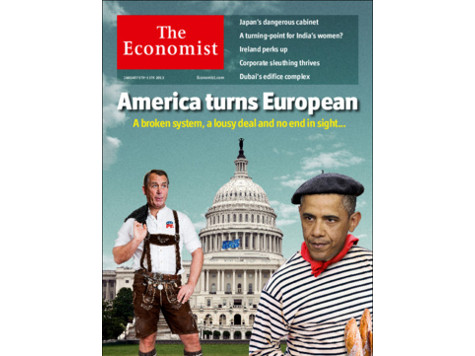The cover of this week’s issue of The Economist features not-so-flattering caricatures of President Obama and Speaker of the House John Boehner. Obama is dressed as the archetypal Frenchman, complete with beret and striped shirt, and Boehner is dressed in lederhosen.
The lead editorial and article are about America becoming European. Manning up is not the first impression the cover suggests but the implication of a sad spectacle of systemic weakness in our nation’s leadership. We should be thankful, however, that the best part about the cover is that Obama is not dressed as Juan Perón.
The articles in the issue critically analyze and lament the lack of leadership in Washington DC during the “fiscal cliff crisis” and compare our economic crisis to that of Europe’s. In comparing the United States to Europe, The Economist focused on three characteristics common to both: the inability to recognize the long-term problem of the debt, the influence of special interest groups and their respective representatives, and the failure of our leaders being honest to the nation.
The articles identify the key issues for hampering the long-term solution to our country’s economic crisis; essentially too many unfunded liabilities, particularly Medicare, along with the unsustainable expenditures to Social Security. One has to wonder if The Economist has not suffered selective memory failure; it was that same newspaper that endorsed President Obama in November.
What did they think was going to happen? That newspaper soured on Mitt Romney because of his waffling on the economy and endorsed Obama because they knew what he stood for. Well, guess what; Obama has always telegraphed what he stood for and what he was going to do as president, so a newspaper as prestigious as The Economist should not be surprised.
In past issues, The Economist has suggested that in order to correct our nation’s long-term economic problems that are critical to our prosperity; we need to cut three dollars of spending for every one dollar in tax revenue increases. Many economists agree with this ratio. Sometime within the next two months, our nation’s debt ceiling will be reached and Congress and the President will need to summon up the leadership skills necessary to deal with uncontrolled spending.
The follow-on conflict over the debt ceiling will be as contentious. On one side, responsible Republicans and Democrats know that the current rate of spending is not sustainable in a healthy economy, let alone an economy which has an anemic growth rate hampered by the drag of a string of unsuccessful stimulus programs, bailouts, and onerous regulatory burdens. Irresponsible politicians will either look to make sure that the “gimmes” are funded before seriously dealing with the debt ceiling, or they will remain in a state of denial that the rich still need to pay more of their fair share in order to make sure the spending can continue.
It is difficult to imagine, and surely frustrating to The Economist, why reasonable leaders on both sides of the Atlantic would not want to resolve their respective contemporary fiscal problems so that future generations will be able to benefit from a well-managed federal system. Or, maybe it’s as simple as that Obama really doesn’t understand the magnitude of the debt problem. As Sarah Palin wittily stated the last time we faced the debt ceiling: “it’s a matter of public record that I did not go to Harvard, but I do know how to add.”

COMMENTS
Please let us know if you're having issues with commenting.